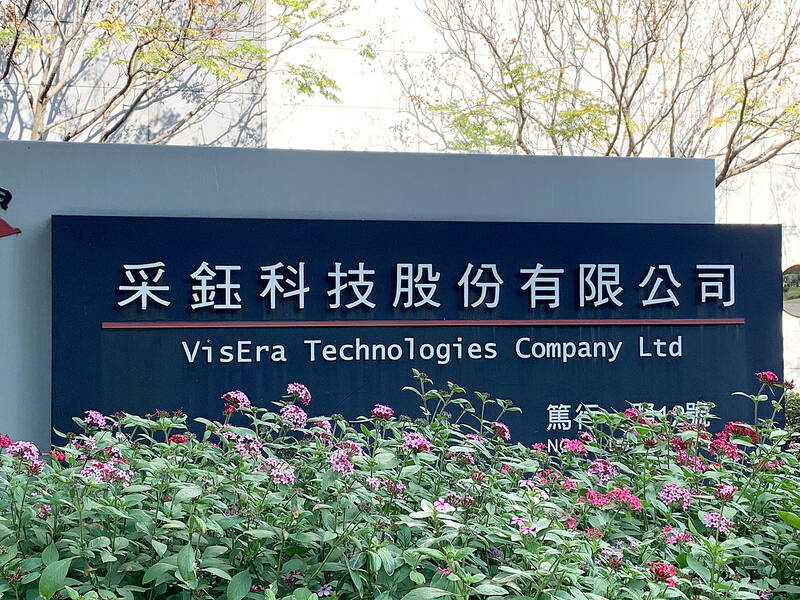Optical film packaging and CMOS image sensor (CIS) manufacturer VisEra Technologies Co (采鈺) yesterday said revenue in the first half of this year would be flat from the same period last year.
That comes as the company expects its image sensor business to remain robust in the first half thanks to the launch of new smartphone models and electric vehicle makers upgrading self-driving technology, although its sales of micro-optical elements would face more competition from rivals, VisEra said in an online earnings conference.
The company, created in 2003 as a spin-off from Taiwan Semiconductor Manufacturing Co (台積電) with investment from image sensor partners, expects revenue growth to gradually pick up steam in the second half of the year on the back of seasonal demand, it said.

Photo: Grace Hung, Taipei Times
The image sensor business accounted for 71 percent of VisEra’s revenue last quarter, while micro-optical elements made up 27 percent, company data showed.
Revenue this quarter would be lower than last quarter, as the smartphone industry has entered a slow season and national holidays cut short the number of business days, but it would still be better than the first quarter last year, VisEra chairman Robert Kuan (關欣) said.
Kuan’s remarks came after the company reported that revenue increased 43.09 percent to NT$2.69 billion (US$82 million) year-on-year last quarter from NT$1.88 billion.
On a quarterly basis, fourth-quarter revenue fell 2.18 percent from NT$2.75 billion, the company said, attributing the better-than-normal seasonal decline to customers’ stocking demand ahead of the Lunar New Year holiday and completing inventory adjustments by the end of the year.
Gross margin was 33.9 percent last quarter, down from 36.1 percent in the previous quarter, but up from 11.5 percent a year earlier, which VisEra said was primarily driven by an improved product mix and a better capacity utilization rate.
Net profit was NT$557 million and earnings per share came in at NT$1.76 last quarter, representing a fall of 3 percent from the previous quarter, but a 1,500 percent surge year-on-year, company data showed.
For the whole of last year, revenue rose 38.2 percent year-on-year to NT$10.02 billion, gross margin improved 13.7 percentage points to 30.5 percent and net profit jumped to NT$1.74 billion from NT$356 million. Earnings per share were NT$5.49, up from NT$1.13 the previous year, company data showed.
Kuan said the company’s CIS production capacity was fully loaded last year as a new plant in Taoyuan’s Longtan District (龍潭) only came on board in the second half of the year.
The company expects annual CIS output this year to be higher than last year’s level, he said.
“We expect to see an increase in high-end CIS. For example, the proportion of automotive CIS would increase this year, along with relatively good prices,” Kuan said.
“In addition, mass production of new image sensors in the second half of the year is also an opportunity to increase revenue,” he said.
VisEra plans to earmark between US$70 million and US$90 million for capital expenditure this year, higher than last year’s US$37 million, as the company aims to improve process technology, purchase new equipment, and beef up its research and development, Kuan said.

Anna Bhobho, a 31-year-old housewife from rural Zimbabwe, was once a silent observer in her home, excluded from financial and family decisionmaking in the deeply patriarchal society. Today, she is a driver of change in her village, thanks to an electric tricycle she owns. In many parts of rural sub-Saharan Africa, women have long been excluded from mainstream economic activities such as operating public transportation. However, three-wheelers powered by green energy are reversing that trend, offering financial opportunities and a newfound sense of importance. “My husband now looks up to me to take care of a large chunk of expenses,

SECTOR LEADER: TSMC can increase capacity by as much as 20 percent or more in the advanced node part of the foundry market by 2030, an analyst said Taiwan Semiconductor Manufacturing Co (TSMC, 台積電) is expected to lead its peers in the advanced 2-nanometer process technology, despite competition from Samsung Electronics Co and Intel Corp, TrendForce Corp analyst Joanne Chiao (喬安) said. TSMC’s sophisticated products and its large production scale are expected to allow the company to continue dominating the global 2-nanometer process market this year, Chiao said. The world’s largest contract chipmaker is scheduled to begin mass production of chips made on the 2-nanometer process in its Hsinchu fab in the second half of this year. It would also hold a ceremony on Monday next week to

State-run CPC Corp, Taiwan (CPC, 台灣中油) yesterday signed a letter of intent with Alaska Gasline Development Corp (AGDC), expressing an interest to buy liquefied natural gas (LNG) and invest in the latter’s Alaska LNG project, the Ministry of Economic Affairs said in a statement. Under the agreement, CPC is to participate in the project’s upstream gas investment to secure stable energy resources for Taiwan, the ministry said. The Alaska LNG project is jointly promoted by AGDC and major developer Glenfarne Group LLC, as Alaska plans to export up to 20 million tonnes of LNG annually from 2031. It involves constructing an 1,290km

TECH CLUSTER: The US company’s new office is in the Shalun Smart Green Energy Science City, a new AI industry base and cybersecurity hub in southern Taiwan US chip designer Advanced Micro Devices Inc (AMD) yesterday launched an office in Tainan’s Gueiren District (歸仁), marking a significant milestone in the development of southern Taiwan’s artificial intelligence (AI) industry, the Tainan City Government said in a statement. AMD Taiwan general manager Vincent Chern (陳民皓) presided over the opening ceremony for the company’s new office at the Shalun Smart Green Energy Science City (沙崙智慧綠能科學城), a new AI industry base and cybersecurity hub in southern Taiwan. Facilities in the new office include an information processing center, and a research and development (R&D) center, the Tainan Economic Development Bureau said. The Ministry